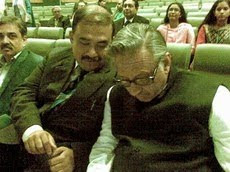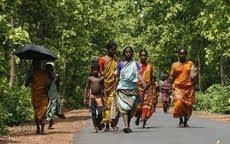
By Subir Bhaumik
Barely two months in power, Bangladesh’s newly-elected Awami League government has handled a dangerous crisis created by the borderguards mutiny with a successful carrot-and-stick approach that helped avert a huge bloodbath .
 The nation’s first Home Minister Sahara Khatun, who displayed amazing courage when she twice drove into the Bangladesh Rifles (BDR) headquarters at Pilkhana to persuade and finally disarm the mutinous borderguards , right claimed that a possible confrontation between the army and the BDR troops had been averted by “a patient political approach.” This was the worst crisis the new government of Prime Minister Sheikh Hasina faced after assuming office. By all accounts, she and her ministerial colleagues handled it with great élan and maturity . Even as the army prepared for a final assault on the BDR headquarters at Pilkhana in Dhaka where the rebellious BDR troops were holed up in great numbers , Sheikh Hasina kept sending her young inexperienced ministers to negotiate with the rebellious troops, asking them to surrender .
The nation’s first Home Minister Sahara Khatun, who displayed amazing courage when she twice drove into the Bangladesh Rifles (BDR) headquarters at Pilkhana to persuade and finally disarm the mutinous borderguards , right claimed that a possible confrontation between the army and the BDR troops had been averted by “a patient political approach.” This was the worst crisis the new government of Prime Minister Sheikh Hasina faced after assuming office. By all accounts, she and her ministerial colleagues handled it with great élan and maturity . Even as the army prepared for a final assault on the BDR headquarters at Pilkhana in Dhaka where the rebellious BDR troops were holed up in great numbers , Sheikh Hasina kept sending her young inexperienced ministers to negotiate with the rebellious troops, asking them to surrender .  But since that did not work, Hasina issued a stern warning to the rebellious troops on Thursday afternoon, asking them “not to tax her patience.” Soon after, army tanks and armoured personnel carriers rolled into Dhaka and began taking up positions around Pilkhana. The mutinous BDR troops finally realized it was time to give up or face annihilation by a much superior force – the Bangladesh army. What is good for Bangladesh is the way its army behaved in this crisis. Even with scores of their brother-officers killed by the rebellious troops, the army did not disregard the civilian government and push ahead with the final assault that would have caused a huge bloodbath.
But since that did not work, Hasina issued a stern warning to the rebellious troops on Thursday afternoon, asking them “not to tax her patience.” Soon after, army tanks and armoured personnel carriers rolled into Dhaka and began taking up positions around Pilkhana. The mutinous BDR troops finally realized it was time to give up or face annihilation by a much superior force – the Bangladesh army. What is good for Bangladesh is the way its army behaved in this crisis. Even with scores of their brother-officers killed by the rebellious troops, the army did not disregard the civilian government and push ahead with the final assault that would have caused a huge bloodbath.The BDR troops have some genuine grievances over poor pay and perks , pensions and career prospects. The officer cadre is entirely from the army and through Bangladesh’s long years of direct military rule or military-dominated civilian governments ( like the BNP government of Begum Khaleda Zia), the grievances of the BDR troops, who rarely get commissioned, was never taken seriously. Non-violent protests by the BDR troops occurred almost every year in several barracks during Begun Zia’s first government (1991-96). So when the Awami League came to power this January, the BDR troops felt they had a popular government bereft of military domination who could finally hear them out and meet some of their grievances.
 But the BDR top brass, all army officers, did not allow the troops to represent their cause to the Awami league government – even when Prime Minister Sheikh Hasina visited their headquarters during the Rifles Week. A day later, angry BDR troops shot dozens of their commanders including the chief Major General Shakil Ahmed and started bloody mutiny. Sheikh Hasina has set up commission headed by the brave Home Minister Sahara Khatun to investigate the BDR grievances and offer remedies that the government promises to implement. The prime minister has also offered general amnesty to the rebellious troops though many have been arrested after they surrendered, raising prospects of severe disciplinary action.
But the BDR top brass, all army officers, did not allow the troops to represent their cause to the Awami league government – even when Prime Minister Sheikh Hasina visited their headquarters during the Rifles Week. A day later, angry BDR troops shot dozens of their commanders including the chief Major General Shakil Ahmed and started bloody mutiny. Sheikh Hasina has set up commission headed by the brave Home Minister Sahara Khatun to investigate the BDR grievances and offer remedies that the government promises to implement. The prime minister has also offered general amnesty to the rebellious troops though many have been arrested after they surrendered, raising prospects of severe disciplinary action.
 Actually throughout this crisis, Hasina managed to keep the army under control. As the news of the massacre of the army officers commanding the BDR spread, tempers rose in the army and there was severe pressure on the Bangladesh army chief General Moeen U Ahmed to launch a huge assault on the Pilkhana headquarters of BDR. When the mutiny spread all across Bangladesh and exchange of fire between BDR and the army started in several places, General Moeen started pushing for a final assault on Pilkhana and , according to unconfirmed reports, even pushed the Prime Minister to declare an emergency. But Hasina bravely stood her ground even as an equally brave Home minister entered the compound of the rebellious troops without armed escorts for the second time in ten twelve hours, reminding them “I am like your mother, believe me , no army will come here if you lay down arms.”
Actually throughout this crisis, Hasina managed to keep the army under control. As the news of the massacre of the army officers commanding the BDR spread, tempers rose in the army and there was severe pressure on the Bangladesh army chief General Moeen U Ahmed to launch a huge assault on the Pilkhana headquarters of BDR. When the mutiny spread all across Bangladesh and exchange of fire between BDR and the army started in several places, General Moeen started pushing for a final assault on Pilkhana and , according to unconfirmed reports, even pushed the Prime Minister to declare an emergency. But Hasina bravely stood her ground even as an equally brave Home minister entered the compound of the rebellious troops without armed escorts for the second time in ten twelve hours, reminding them “I am like your mother, believe me , no army will come here if you lay down arms.”  Hasina’s government may now scale down in phases the numbers of army officers commanding the BDR. These officers are clearly unpopular, as demonstrated by the bloody mutiny. In our own Assam Rifles, a similar divide existed for years before the government was forced to address it . Hasina may therefore introduce direct entry officers for the BDR, as exists in our own Border Security Force. Her government may even open up the officer cadre to promotion from the ranks for those with years of meritorious service. And if she manages to upgrade the pay and perks of BDR troops reasonably, her government might even get away by punishing those directly involved in the mutiny. In fact, a loyal BDR may be Hasina’s safest bet against the possible political ambitions of the Bangladesh army.
Hasina’s government may now scale down in phases the numbers of army officers commanding the BDR. These officers are clearly unpopular, as demonstrated by the bloody mutiny. In our own Assam Rifles, a similar divide existed for years before the government was forced to address it . Hasina may therefore introduce direct entry officers for the BDR, as exists in our own Border Security Force. Her government may even open up the officer cadre to promotion from the ranks for those with years of meritorious service. And if she manages to upgrade the pay and perks of BDR troops reasonably, her government might even get away by punishing those directly involved in the mutiny. In fact, a loyal BDR may be Hasina’s safest bet against the possible political ambitions of the Bangladesh army.But Hasina’s government will have to punish those responsible for killing the officers during the mutiny. If that does not happen, she risks upsetting the powerful Bangladesh army. With virtually no political opposition (the BNP and Jamiat e Islami got only one-tenth of the seats in the parliament), Hasina’s only real worry is the army. So far, the army chief Moeen U Ahmed has acted with restraint to reinforce the growing professionalism in the force . He knows Bangladesh’s growing UN peace keeping assignments depends on the army’s professional stature. But if the mutineers are not punished, even Moeen may find it difficult to cool tempers among his officers. Already some officers are pushing him hard to drive a hard bargain with the government, demanding exemplary punishment for the mutineers and a takeover of the BDR by the army.
(Subir Bhaumik is the BBC's East India Correspondent and a known Bangladesh specialist)






